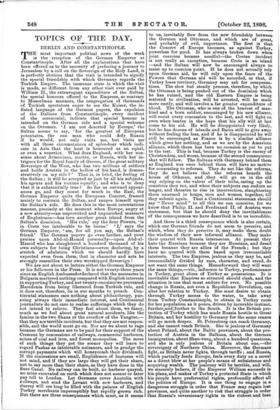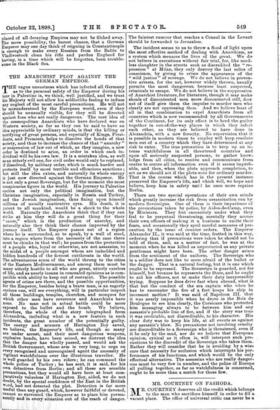TOPICS OF THE DAY.
BERLIN AND CONSTANTINOPLE. THE most important political news of the week is the reception of the German Emperor at Constantinople. After all the explanations that have been offered as to the necessity of prefacing a journey to Jerusalem by a call on the Sovereign of the Holy Land, it is perfectly obvious that the visit is intended to signify the special friendship with which Germany regards the Turkish Empire. The immense state in which the visit is made, so different from any other visit ever paid by William II., the extravagant expenditure of the Sultan, the special honours offered to the Empress, so contrary to Mussulman manners, the congregation of thousands of Turkish spectators eager to see the Kaiser, the in- flated language of the German papers, the expulsion of the Italians from Constantinople, every incident of the ceremonial, indicate that special honour is intended on the German side and a special welcome on the Ottoman. 'I am not deserted by Europe,' the Sultan seems to say, for the greatest of European potentates, the one man who could defy Russia if he would, not only visits me, but visits me with all those circumstances of splendour which indi- cate in Asia that the host is honoured as an equal, or even a superior. What does England, with her non- sense about Armenians, matter, or Russia, with her in- trigues for the Royal family of Greece, if the great military Sovereign of the West, who has two millions of soldiers and holds Austria in the hollow of his hand, is demon- stratively on my side ? ' That is, in brief, the feeling of the Sultan ; it will be accepted as just by all his subjects, his agents and his victims equally ; and who is to deny that it is substantially true ? So far as outward appear- ances go, and they count for much in the East, the German Emperor quits the European Concert, framed mainly to restrain the Sultan, and ranges himself upon the Sultan's side. He does this in the most ostentatious manner, precisely at the moment when Europe, angry at a new atrocity—an unprovoked and unpunished massacre of Englishmen—has torn another great island from the Sultan's dominion. His rule,' say the four Powers, 'is in Crete too intolerable to be borne." I,' says the German Emperor, 'am, for all you say, the Sultan's friend.' The German papers go even farther, and pour praises upon Abd-ul-Hamid personally—upon Abd-ul- Hamid who has slaughtered a hundred thousand of his own subjects for being Christians—even declaring, by a stretch of adulation which we should hardly have expected even from them, that in character and acts he strongly resembles their own worshipped Sovereign !
We are not about to lecture either the German Emperor or his followers in the Press. It is not twenty-three years since an English Ambassadordeclared that the massacres in Bulgaria mattered nothing compared with English interests in supporting Turkey, and not twenty-one since we prevented Macedonia from being liberated from Turkish rule, and it does not, therefore, lie in our mouths to preach. Con- tinental statesmen care nothing about philanthropy, pur- suing always their immediate interest, and Continental journalists do not care to realise sufferings which they do not intend to relieve. They feel about them, we fancy, much as we feel about great natural accidents, like the famine in the two Shans or the overflow of the Yangtse,— that they are terrible incidents, but that they are not respon- sible, and the world must go on. Nor are we about to rage because the Germans are to be paid for their support of the Crescent by concessions of railways, commercial harbours, mines of coal and iron, and forest monopolies. The more of such things they get the sooner they will learn to regard Pashas as intolerable nuisances, and to grudge the corrupt payments which will honeycomb their dividends. If the concessions are small, Englishmen of business will not mind, and if they are large they will get their share, not to say more than their share, as they have done in the Suez Canal. No railway can be built, no harbour quayed, no mine excavated on earth which does not sooner or later pay toll to London. Let Germans cover Anatolia with railways, and stud the Levant with new harbours, and surrey will ere long be filled with the palaces of English Turkey merchants imperceptibly but rapidly grown rich. But there are three consequences which must, as it seems to us, inevitably flow from the new friendship between. the German and Ottoman, and which are of great, and probably of evil, importance. The first is that the Concert of Europe becomes, as against Turkey, powerless for good. It has always broken down when joint coercion became needful—the Cretan incident is not really an exception, because Crete is an island —and the Sultan will now be encouraged always to resist up to coercion point. If he does not actually rely upon German aid, he will rely upon the fears of the Powers that German aid will be accorded, or that, if Turkey loses territory, Germany may ask for compensa- tions. The slow but steady process, therefore, by which the Ottoman is being pushed out of the dominion which. he has ruined, and the old Eastern Empire is being restored to civilisation, will be arrested, will be made more costly, and will involve a far greater expenditure of blood. The Ottoman, who is one of the bravest of man- kind and a born soldier, encouraged by his new alliance,. will resist every concession to the last, and will fight on even when beaten in the hope that his ally will at last come to his aid. He will be disappointed very likely, but he has dozens of islands and Barca, still to give away without feeling the loss, and if he is disappointed he wiI still be encouraged as France is by a similar alliance which gives her nothing, and as we are by the American alliance, which there has been no occasion as yet to put to the test. This is bad, because Turkey is the enemy of Christendom, and worse, because of the second consequence- that will follow. The Sultans with Germany behind them_ as England was once behind them will have no motive for consenting to reforms. They do not like the reforms, they do not believe that the reforms benefit the house of Othman, and they will go on in the old. way relying on the valour of their tribe, eating up the countries they tax, and when their subjects can endure no longer, and threaten to rise in insurrection, slaughtering them unarmed in heaps, men and women together, tilt they submit again. That a Continental statesman should say "Never mind" to all this we can conceive, for we know that Philip II. and Ferdinand II. of Austria were statesmen, but that he should deny the inevitableness' of the consequences we have described is to us incredible.
And there is a third consequence which is also certain, which our German friends do not seem to perceive, and. which, when they do perceive it, may make them doubt the wisdom of their new informal alliance. They make their quarrel with Russia internecine. At present they hate the Russians because they are Russians, and dread them because they are allies of the French ; but they have no quarrel with them based upon irreconcilable interests. The two Empires, jealous as they may be, and irreconcilably divided by race, character, and creed, do not want the same things. Henceforward they will want the same things,—viz., influence in Turkey, predominance in Turkey, great slices of Turkey as possessions. It is inevitable that Empires so situated should clash, and the situation is one that must endure for ever. No possible change in Russia, not even a Republican Revolution, can alter her relation to Turkey. She must desire to obtain through Turkey access to the water, to take away from Turkey Constantinople, to obtain in Turkey room for her population as it pours, driven by incurable instinct, further‘and,-further to the South. It is the British pro- tection of Turkey which has made Russia hostile to Great Britain, and her hostility to Germany for the same reason will go much deeper. St. Petersburg can reach Germany, and she cannot reach Britain. She is jealous of Germany about Poland, about the Baltic provinces, about the pro- tection of Austria in the Balkans, about the German immigration, about Shan-tung, about a hundred questions, and she is only jealous of Britain about one,—the sovereignty of Northern China. Moreover, the Germans fight, as Britain never fights, through tariffs ; and Russia, which partially feeds Europe, feels every duty on a cereal as a direct blow at her people's means of subsistence and acquiring wealth. The jealousy will be terrible, and will, we sincerely believe, if the Emperor William succeeds in his plans, and makes of Turkey a protected State in which his people have preferential rights, profoundly affect all the politics of Europe. It is one thing to engage in a dangerous struggle in order that France may regain lost provinces, and quite another to risk that struggle in order that Russia's reversionary rights in the richest and best placed of all decaying Empires may not be filched away. The mere possibility, the barest chance, that a German Emperor may one day think of reigning in Constantinople is enough to make every Russian from the Baltic to Vladivostock clean his rifle and pardon England for having, in a time which will be forgotten, been trouble- some in the Black Sea.











































 Previous page
Previous page